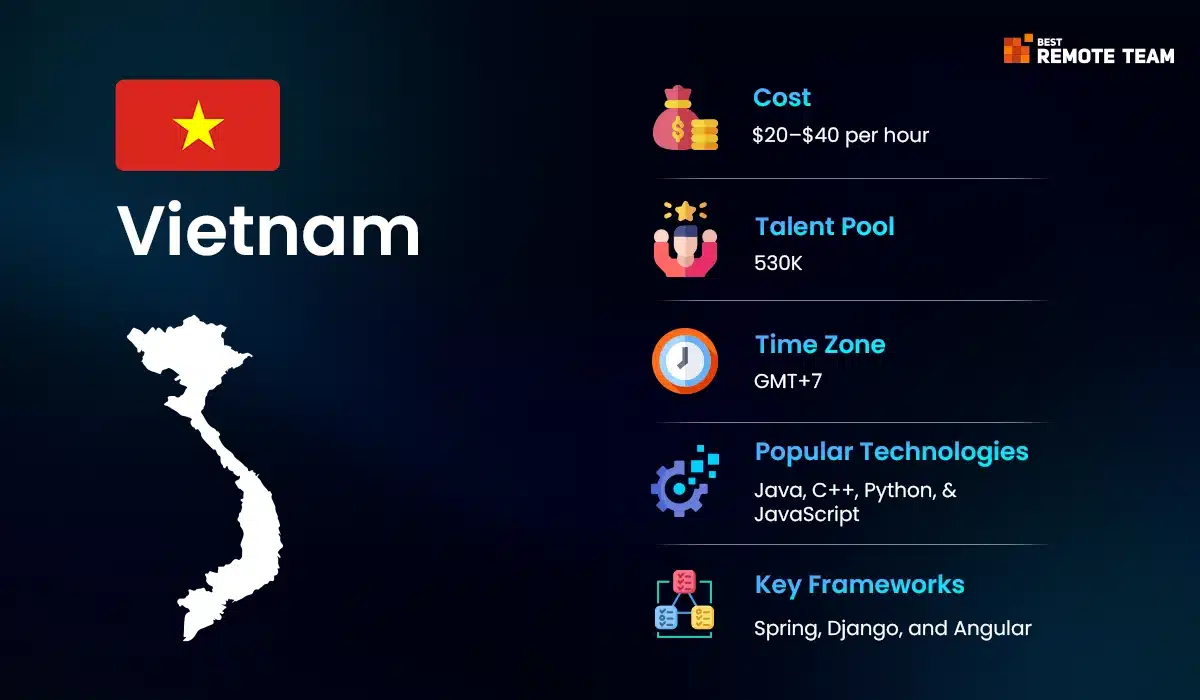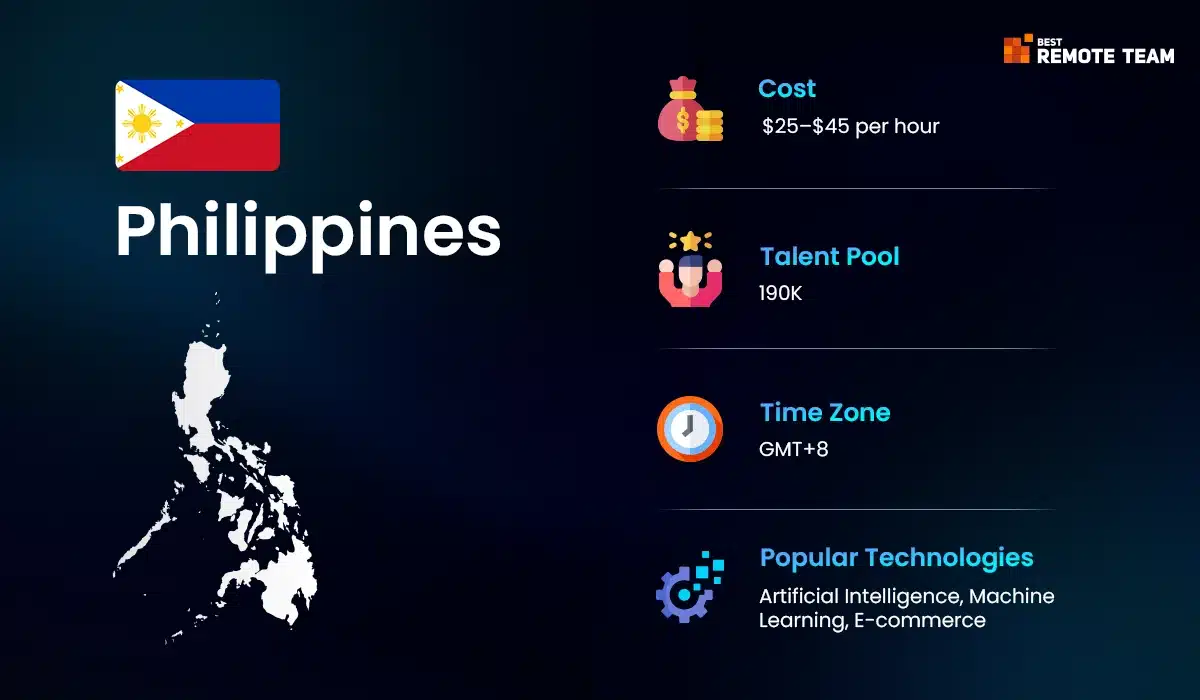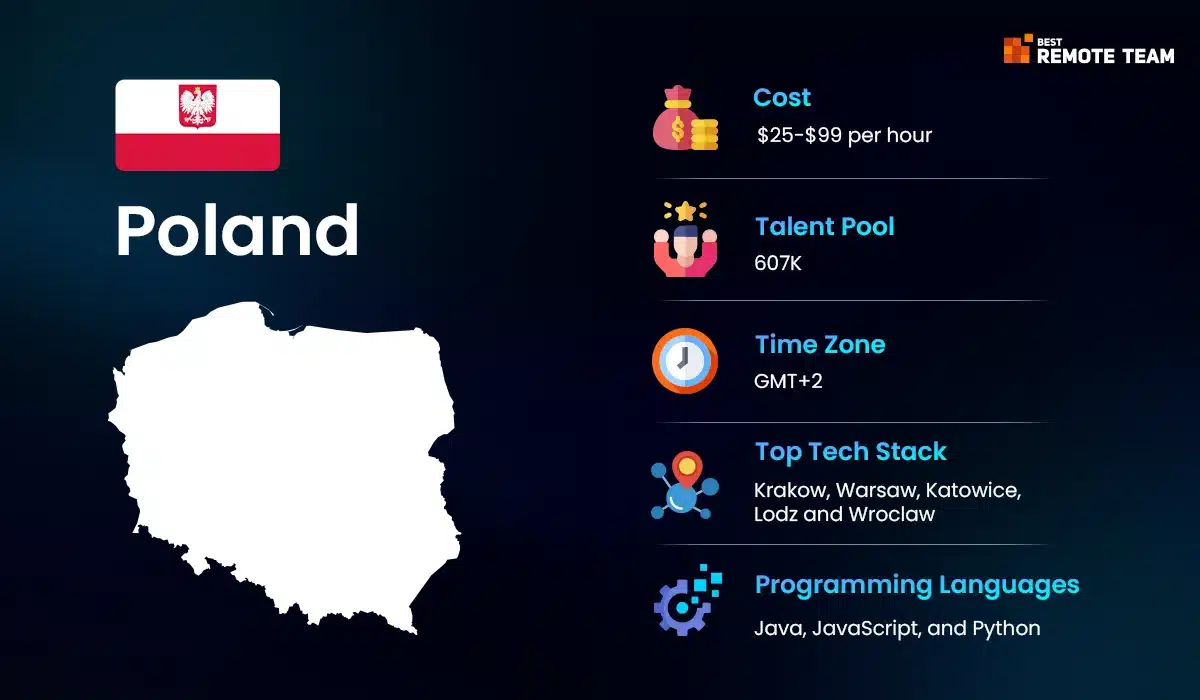What is Offshore Software Development?
Offshore software development assigns software development chores to a third-party business or team imported from outside. When a vendor is situated abroad, usually one that provides less expensive software development services, the term “offshore” is often used. Offshore development services cover web development mobile app design and software maintenance and much more.
Did you know, United States will generate the most revenue globally in 2024, reaching a staggering US$197.30 billion? This significant figure highlights the country’s dominant position in the global economy.
Offshore software development lets businesses:
- Lower development expenses.
- Get access to specific knowledge.
- Change your scale depending on the project requirements.
- While professionals handle technological details and concentrate on basic corporate chores.
What Makes a Country Good for Outsourcing?
Many elements define a nation’s fit for outsourcing software development. Among them are:
- Money: Usually, outsourcing is motivated mostly by lower rates. The price must be weighed, nevertheless, with quality.
- Skill Set: The availability of gifted creators with specific knowledge.
- Compatibility with Time Zones: Managing communication and teamwork is simpler in the closer time zone.
- English Ability: Perfect project execution depends on strong English communication abilities.
- Technical Reference: The essentials are a stable internet connection and access to the latest technological tools.
- Political Consistency: A politically stable nation with safe surroundings guarantees the continuous availability of services.
Top 5 Country in The World for Offshore Software Development
Here are 5 top countries that fulfill all your needs for Offshore software development:
1. Vietnam
Rate: $20-$40 per hour
Vietnam is a rising star in the offshore software development company. The nation’s technology industry has witnessed notable expansion over the last ten years, drawing international businesses seeking qualified and reasonably priced developers. In 2024, it is projected to generate an impressive revenue of US$694.80m, as reported by Statista.
Pros
- Vietnam has some of the most cheap prices for software development.
- The nation’s growing pool of developers, many of whom are young and adept in new technologies, represents a youthful and talented workforce.
- Vietnamese colleges are turning out graduates with a solid background in technology and software engineering.
Cons
- Language Barrier: Although many developers speak English, competency is usually less than that of other nations.
- Cultural Differences: Navigating cultural variances in work habits and communication methods may be difficult for certain companies.
According to a report by NASSCOM, more than 50% of Fortune 500 companies in the U.S. outsource their software development services to India.
2. India
Rate: $15-$35 per hour
India is usually recognized as the leader in offshore software development worldwide. For years, businesses seeking to outsource software development turned to it first because of its cheap cost and great skill pool. In 2024, it is projected to generate an impressive revenue of US$11.04bn, as reported by Statista.
Pros
- Large Talent Pool: India generates millions of IT graduates annually, providing a rich pool of knowledge in many programming languages and technologies.
- Cost-Effective: Attractive for startups and small companies, India has the lowest development rates among countries.
- English Proficiency: India has a lot of English-speaking developers, which helps ease contact with Western businesses.
Cons
- Time Zone Difference: The notable time zone difference may lead to communication delays for European and American businesses.
- Quality Variability: Although many talented developers exist, offshore organizations’ work quality might differ significantly.
3. Philippines
Rate: $25-$45 per hour
Another well-known place for offshore software development, especially for companies seeking dependable and reasonably priced IT solutions in Southeast Asia, is the Philippines. In 2024, it is projected to generate an impressive revenue of US$715.50m, as reported by Statista.
Pros
- Strong English Proficiency: The Philippines rates well in English competency, therefore facilitating quick and effective international client contact.
- Cultural Compatibility: The Philippines easily aligns work standards and styles as it strongly connects with Western civilization.
- Growing IT Industry: The nation has been building its IT infrastructure and education, which has produced an increasing pool of talented developers.
Cons
- Limited Expertise in Advanced Technologies: Though Philippine developers are competent, the nation would have fewer professionals in cutting-edge technologies such as artificial intelligence and machine learning.
- Time Zone Difficulties: The Philippines might still provide time zone difficulties for businesses in Europe or the Americas even if it is closer to Asia-Pacific.
4. Poland
Rate: $40-$70 per hour
Poland has become somewhat well-known in Europe for offshore software development. A strong emphasis on technology and innovation drives this nation’s highly educated and highly trained workforce. In 2024, it is projected to generate an impressive revenue of US$3.49bn, as reported by Statista.
Pros
- High-Quality Talent: Poland is well-known for producing talented engineers knowledgeable in many programming languages.
- Cultural Similarity to Western Europe: Polish developers simplify cooperation by sharing work principles and communication methods with Western European counterparts.
- Proximity to Europe: For European businesses, Poland has the benefit of being in a comparable time zone, which promotes real-time communication.
Cons
- Greater Rates: Poland’s development rates are greater than those of countries like Vietnam and India, even if they are still more reasonably priced than Western Europe.
- Restricted Cost Advantage: Poland boasts less cost reductions than other offshore locations.
5. Ukraine
Rate: $30-$60 per hour
Ukraine’s low prices and a vast pool of gifted developers have made it one of Eastern Europe’s top offshore destinations. The IT sector in Ukraine is robust even with current political turbulence. In 2024, it is projected to generate an impressive revenue of US$1.09bn, as reported by Statista.
Pros
- Highly Skilled Workforce: Ukraine is well-known for its software development prowess and highly skilled workforce, particularly in fields like artificial intelligence, blockchain, and cybersecurity.
- Competitive Rates: Ukraine provides a mix of quite reasonable costs for very superior services.
- Proximity to Europe: Ukraine’s time zone is near Western Europe, facilitating smooth cooperation like Poland’s.
Cons
- Political Unrest: The continuous conflict in Ukraine can cause questions on the long-term viability of software development activities.
- Language barrier: Although many developers speak English, their degree of competency may differ, which may influence communication.
How to Choose a Reliable Offshore Software Development Partner?
Here is a more thorough guide to the main actions to guarantee you choose the appropriate reliable offshore development partner:
#1. Evaluate Knowledge and Expertise
Analyze the experience and knowledge of any offshore development business you are considering closely. Examine their portfolio to see if they have worked on related projects in your sector. This can help you know if they grasp the technical criteria and obstacles in your area. Ask also about their knowledge of the most recent technologies, frameworks, and programming languages that are fit for your project.
#2. Review Client Testaments and Notes
A company’s dependability and quality are much enhanced by its performance with past customers. Search for reviews and testimonies on websites such as Clutch, GoodFirms, or Google. Ask the business for recommendations; reach out to former customers for firsthand stories. Emphasize getting comments on the team’s technical competency, communication, timeline adherence, and general professionalism.
#3. Perform Technical Inquiries
Even if you are outsourcing, it is crucial to guarantee the team’s technical competency is current. To evaluate the team’s coding abilities and problem-solving capacity, do technical interviews or provide a little test project. This stage lets you verify whether they can satisfy your project’s criteria and possess the necessary technical competence.
#4. Consider Time Zone and Communication
Depending on how effectively you control them, time zone variations could either provide advantages or challenges. Although offshore might have financial benefits, major time zone differences could cause delays in cooperation and decision-making. To enable frequent contact, choose a partner whose working hours somewhat coincide with your own. Analyze also the team’s communication and English competency. Smooth project development and avoidance of misconceptions depend on effective communication.
#5. Start with a Little Project or Trial Period
Consider beginning a smaller project or trial period before committing to a long-term contract. This will allow you to assess team performance under actual project settings. Pay close attention to their timeliness, flexibility in response to criticism, and clarity of progress-oriented communication.
Conclusion
Among the many advantages offshoring software development provides are cost savings, worldwide talent availability, and flexibility. However, choosing the correct nation and partner will determine whether outsourcing succeeds.
At Best Remote Team, we have a dedicated team of developers who can bring your software development requirements into reality. Our team leads your software development project from the front developing the software that features all your high-end capabilities that bring impressive growth to your business.
Contact us today to give the upper hand to your development.









